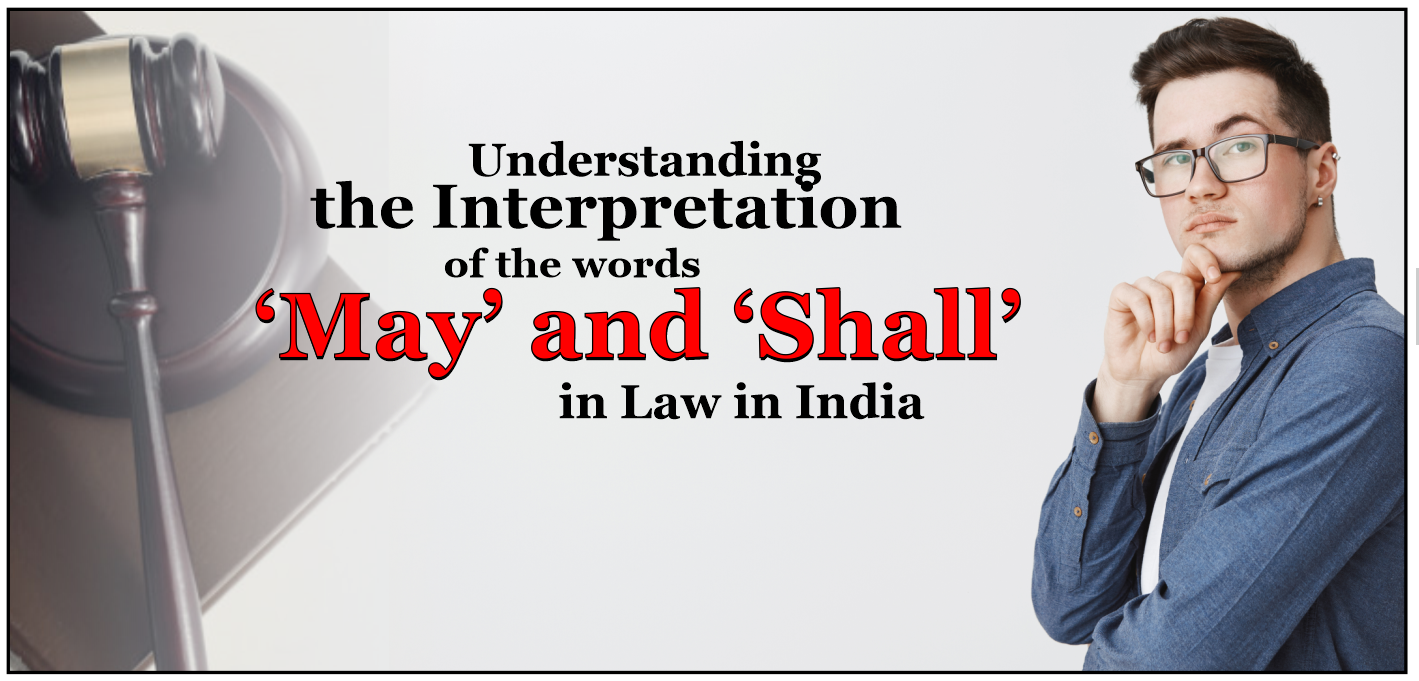THE CONCEPT
The word ‘may’ and ‘shall’ have always been contentious issues in various enactments and legal documents. This is because in some circumstances the word ‘may’ have been treated as mandatory like ‘shall’. Whereas in some circumstances even the word ‘shall’ has not been used as mandatory and has been treated like the use of the word ‘may’. Thus an understanding of the Interpretation of the words “may” and “shall” as per Indian Law is a subject matter of study of this article.
RULES FOR INTERPRETATION
A. The intention of the Legislature
While interpreting the question of whether a provision of law that contains the word ‘may’ or ‘shall’ is mandatory or directory, the prime rule that should be followed for such interpretation is ascertaining the true intention of the legislature which is guided by the maxim, ‘Mens or Sententia Legis’ by considering the entire statute.
According to Salmond,
“As the essence of the law lies in the spirit, not in its letter, but letters are the only way in which intentions are expressed. The words are an external manifestation of intention that it involves. When there is the possibility of one or more interpretations of statute, courts have to adopt that interpretation which reflects the ‘true intention of the legislature’ which can also be considered legal meaning statutory provisions.”
In “Raise on Statute Law” (7th Edn.) it was stated that,
“It is the duty of the Court to try to get at the real intention of the Legislature by carefully analysing the whole scope of the statute or section or a phrase under consideration.”
In “Crawford on the Construction of Statutes” at page 516, it is stated that
The question as to whether a statute is mandatory or directory depends upon the intent of the Legislature and not upon the language in which the intent is clothed. The meaning and intention of the Legislature must govern, and these are to be ascertained, not only from the phraseology of the provision, but also by considering its nature, its design, and the consequences which would follow from construing it the one way or the other….“
| Name of the Case | Court | Decision of Court |
| Sarla Goel & Ors vs Kishan Chand (Civil Appeal No.4162/2009) |
Division Bench, Supreme Court |
where the word ‘may’ shall be read as ‘shall’ would depend upon the intention of the legislature and it is not to be taken that once the word ‘may’ is used, it per se would be directory. In other words, it is not merely the use of a particular expression that would render a provision directory or mandatory. It would have to be interpreted in the light of the settled principles, and while ensuring that intent of the Rule is not frustrated. |
| Mohan Singh and Ors. Vs. International Airport Authority of India and Ors. 1997 (9) SCC 132 |
Division Bench, Supreme Court |
“ 17. The distinction of mandatory compliance or directory effect of the language depends upon the language couched in the statute under consideration and its object, purpose and effect. The distinction reflected in the use of the word ‘shall’ or ‘may’ depends on the conferment of power. In the present context, ‘may’ does not always mean ‘may’. ‘May’ is a must for enabling compliance of provision but there are cases in which, for various reasons, as soon as a person who is within the statute is entrusted with the power, it becomes a duty to exercise. Where the language of the statute creates a duty, the special remedy is prescribed for non-performance of the duty.” |
| Rajender Mohan Rana & Ors vs Prem Prakash Chaudhary & Ors (LPA No. 554/2011) | Division Bench, Delhi High Court | “7. Section 55 uses the word ‘may’ sue, indicating a discretionary element that a joint bhumidhar ”’may”’ approach the Court of Revenue Assistant for partition. Naturally, the word ‘may’ means discretion and is not mandatory. In the present case, we do not see any reason why the word ‘may’ in Section 55 should be read as ‘must’ or ‘shall.’ Courts do not interpret the word ‘may’ as ‘shall’ unless such interpretation is necessary and required to void absurdity, inconvenient consequence or is mandated by the legislature’s intent, which is collected from other parts of the statute.” |
| State of Haryana and Anr. v. Raghubir Dayal (1995) 1 SCC 133 |
Division Bench, Supreme Court |
“ 5. The use of the word ‘shall’ is ordinarily mandatory but it is sometimes not so interpreted if the scope of the enactment or consequences to flow from such construction would not so demand. Normally, the word ‘shall’ prima facie ought to be considered mandatory but it is the function of the Court to ascertain the real intention of the legislature by a careful examination of the whole scope of the statute, the purpose it seeks to serve and the consequences that would flow from the construction to be placed thereon. The word ‘shall’, therefore, ought to be construed not according to the language with which it is clothed but in the context in which it is used and the purpose it seeks to serve. The meaning has to be described to the word `shall; as mandatory or as directory accordingly. Equally, it is settled law that when a statute is passed for the purpose of enabling the doing of something and prescribes the formalities which are to be attended for the purpose, those prescribed formalities which are essential to the validity of such thing, would be mandatory. However, if by holding them to be mandatory, serious general inconvenience is caused to innocent persons or the general public, without very much furthering the object of the Act, the same would be construed as directory. “ |
B. The object of Enactment of Provision
| Name of the Case | Court | Decision of Court |
| Sharif-Ud-Din V. Abdul Gani Lone 1980 AIR 303 | Division Bench, Supreme Court | “4. The question whether a provision of law is mandatory or not, depends upon its language, the context in which it is enacted and its object. The difference between a mandatory rule and a directory rule is that while the former must be strictly observed, in the case of the latter substantial compliance ‘may’ be sufficient to achieve the object regarding which the rule is enacted. Certain broad propositions which can be deduced from several decisions of courts regarding the rules of construction that should be followed in determining whether a provision of law is a directory or mandatory are as follows:
The fact that the statute uses the word ‘shall’ while laying down a duty is not conclusive on the question of whether it is a mandatory or directory provision. In order to find out the true character of the legislation, the Court has to ascertain the object which the provision of law in question is to subserve and its design and the context in which it is enacted. If the object of a law is to be defeated by non-compliance with it, it has to be regarded as mandatory. But when a provision of law relates to the performance of any public duty and the invalidation of any act done in disregard of that provision causes serious prejudice to those for whose benefit it is enacted and at the same time who have no control over the performance of the duty, such provision should be treated as a directory one. Where, however, a provision of law prescribes that a certain act has to be done in a particular manner by a person in order to acquire a right and it is coupled with another provision which confers immunity on another when such act is not done in that manner, the former has to be regarded as a mandatory one. A procedural rule ordinarily should not be construed as mandatory if the defect in the act done in pursuance of it can be cured by permitting appropriate rectification to be carried out at a subsequent stage unless by according such permission to rectify the error, later on, another rule would be contravened. Whenever a statute prescribes that a particular act is to be done in a particular manner and also lays down that failure to comply with the said requirement leads to a specific consequence, it would be difficult to hold that the requirement is not mandatory and the specified consequence should not follow.” |
| A.V. Purushotam vs N.K. Nagaraj ILR 2003 KAR 2458 | Single Bench, Karnataka High Court | 8. From the aforesaid proposition of law, it becomes clear that where the statute uses the word ‘shall’ while laying down a duty it is not conclusive on the question whether it is a mandatory or directory provision. In order to find out the true character of the legislation, the Court has to ascertain the object which the provision of law in question is to subserve and its design and the context in which it is enacted. If the object of the law is to be defeated by non-compliance with it, it has to be regarded as mandatory. A procedural rule ordinarily should not be construed as mandatory. |
C. Conferment of Power
| Name of Case | Court | Decision of Court |
| Official Liquidator v. Dharti Dhan (P) Ltd. (1977) 2 SCC 166 | Division Bench, Supreme Court | “7. In fact it is quite accurate to say that the word ‘may’ by itself, acquires the meaning of ‘must’ or ‘shall’ sometimes. This word, however, always signifies conferment of power. That power ‘may’, having regard to the context in which it occurs, and the requirements contemplated for its exercise, have annexed to it an obligation which compels its exercise in a certain way on facts and circumstances from which the obligation to exercise it in that way arises. In other words, it is the context which can attach the obligation to the power compelling its exercise in a certain way. The context, both legal and factual, ‘may’ impart to the power that obligatoriness.
8. Thus, the question to be determined in such cases always is, whether the power conferred by the use of the word ‘may’ has, annexed to it, an obligation that, on the fulfilment of certain legally prescribed conditions, to be shown by evidence, a particular kind of order must be made. If the statute leaves no room for discretion the power has to be exercised in the manner indicated by the other legal provisions which provide the legal context. Even then the facts must establish that the legal conditions are fulfilled: A power is exercised even when the Court rejects an application to exercise it in the particular way in which the applicant desires it to be exercised. Where the power is wide enough to cover both an acceptance and a refusal of an application for its exercise, depending upon facts, it is a directory or discretionary. It is not the conferment of a power which the word ‘may’ indicates that annexes any obligation to its exercise but the legal and factual context of it.” |
-
D. Cases where the words ‘may’ and ‘shall’ appear in the same section of a Statute
G.P. Singh in his book titled `Principles of Statutory Interpretation’, 11th Edition 2008 at page 409 stated that the use of the word ‘shall’ with respect to one matter and use of the word ‘may’ with respect to another matter in the same section of a statute will normally lead to the conclusion that the word ‘shall’ imposes an obligation, whereas the word ‘may’ confers a discretionary power. But that by itself is not decisive and the Court ‘may’, having regard to the context and consequences, come to the conclusion that the part of the statute using ‘shall’ is also a directory. It is primarily the context in which the words are used which will be of significance and relevance for deciding this issue.
The Last Word
Thus, using the word ‘shall’ in a statutory provision would normally mean that the provision is mandatory, while the word ‘may’ would be a directory. However, the word ‘shall’ is not always decisive and the word ‘may’ does not by itself show that the provision is a directory in nature. To interpret the legal import of the word ‘may’ and ‘shall’, it is of utmost importance that regard must be given to the context, subject matter, and object of the statutory provision to get the real intention of the Legislature. This is important in determining whether the same is mandatory or directory since there is no straight-jacket formula to determine the same.
AUTHOR SHRUTI KAKKAR Junior Legal Research, Indian Law Watch Shruti is BA LL.B from Guru Gobind Singh University pass out. She has been in top three winner positions in several reputed competitions of law.She is presently pursuing the Higher studies.













Add Comment